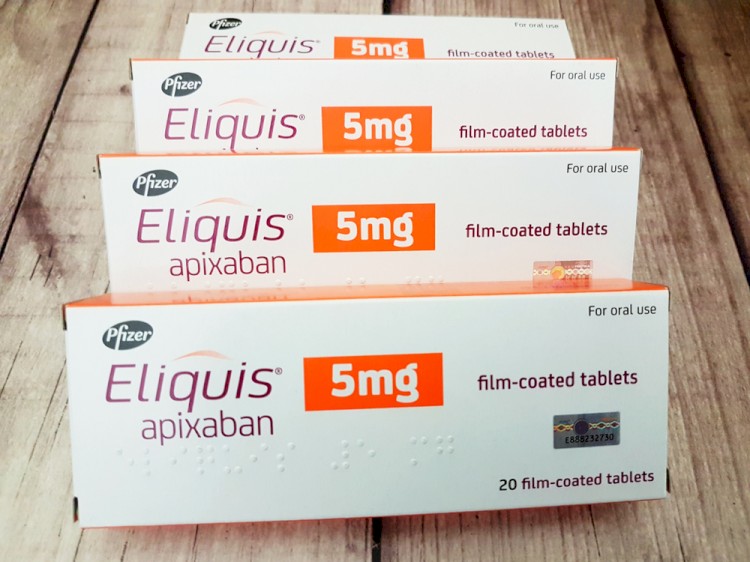Sue asked
I've been taking Eliquis for 3 months. I check my sugar at home on a regular basis, because my parents both had diabetes. I'm 63 and it's always been between 94-99 mg/dL fasting and between 113-120 non-fasting. Today, my non-fasting was 233 mg/dL. My total cholesterol is in the normal range. Do I need to be concerned?
At a glance
- Eliquis (apixaban) has not be reported to increase blood sugar (i.e. glucose) levels.
Answer

Eliquis (Apixaban) is not known to increase blood glucose (i.e. sugar) levels and it is not listed as a side effect in the FDA-approved prescribing information for the drug.
In fact, aside from bleeding complications, very few other side effects for Eliquis have been reported.
All of the following have been reported to occur in less than 1% of patients taking Eliquis:
- Syncope (i.e. dizziness)
- Hypersensitivity reactions (i.e. allergic reactions)
- Skin rash
- Hypotension (low blood pressure)
- Edema (i.e. water retention)
Some clinical trials have reported nausea as well, occurring in about 3% of individuals.
Diabetic Precaution
As stated at the outset, Eliquis has not been reported to have an effect on blood sugar and the drug can be used safely in diabetic patients. Since having diabetes is a risk factor for stroke, Eliquis is commonly prescribed to patients diagnosed with it.
While Eliquis can be prescribed to diabetics, it is important to note that clinical trials have shown that they are more at risk for bleeding episodes than non-diabetic patients.
One large clinical study, published in the New England Journal of Medicine, found that 3% of diabetic patients taking the drug experienced major bleeding episodes per year, compared to 1.9% for non-diabetic patients.
The prescribing information for Eliquis points this out explicitly:
Subjects treated with apixaban [Eliquis] with diabetes bled more (3.0%/year) than did subjects without diabetes (1.9%/year).
Although it is important to consider the bleeding risk of diabetic patients, Eliquis is an effective drug to use in that population to prevent negative health outcomes such as stroke and atrial fibrillation.
One study concluded the following regarding the use of Eliquis in diabetic and non-diabetic patients alike:
Apixaban [Eliquis] has similar benefits on reducing stroke, decreasing mortality, and causing less intra-cranial bleeding than warfarin in patients with and without diabetes.
As discussed, clinical trials for Eliqiuis have not reported any alterations in blood sugar.
Side Effects
Since Eliquis is an anticoagulant, the side effects that are most concerning relate to bleeding episodes. Types of bleeding that have been reported to occur include:
- Gastrointestinal
- Intracranial
- Intraocular
- Contusion (i.e. bruise)
- Epistaxis (i.e. nose bleeds)
Non-bleeding side effects are uncommon but can include nausea, dizziness, low blood pressure and rashes.
When taking any medication that thins the blood, you always want to be aware of the signs and symptoms of bleeding. If they occur, it is important to seek medical attention. Signs and symptoms include:
- Black, bloody or tarry stools
- Dark discolored urine
- Splitting or throwing up blood or brown material
- Easy or unusual bruising
- Bleeding from the eye, gums, or nose
Final Words
If you are testing your blood sugar and are getting unusually high results, you should speak with your doctor.
A non-fasting glucose level of 233 mg/dL is certainly elevated (the American Diabetic Association recommends levels under 180 mg/dL) but the main diagnostic indicator is A1c, which averages glucose levels over time.
Your high reading may be an anomaly, but again, it is important to discuss this with your doctor.
It is unlikely your elevated glucose levels (if they are being accurately reported by your machine) are being affected by taking Eliquis.
References
- Eliquis Prescribing Information. AccessFDA
- Quick reference guide to apixaban. PubMed
- Apixaban. StatPearls
- Clinical outcomes of patients with diabetes and atrial fibrillation treated with apixaban: results from the ARISTOTLE trial. PubMed
- Direct oral anticoagulants for stroke prevention in atrial fibrillation: treatment outcomes and dosing in special populations. PubMed
- Checking Your Blood Glucose. American Diabetic Association




